Auditing Practice Report: Auditor Independence and Big Banks
VerifiedAdded on 2022/09/23
|12
|2681
|29
Report
AI Summary
This report provides a comprehensive analysis of auditor independence within the auditing profession, focusing on the critical need for unbiased audit opinions. It defines auditor independence, emphasizing the importance of objectivity and the ramifications of compromised independence, including potential audit failures and reputational damage. The report examines the justifications of banks, such as Commonwealth Bank, regarding the provision of non-audit services by audit firms, exploring the role of audit committees and adherence to regulatory standards like APES 110. It also addresses the question of accountability, assigning responsibility to both audit firms and clients for ensuring independence, and suggests policies to improve and maintain auditor independence, such as pre-clearance from regulatory bodies. The report concludes by reiterating the crucial role of auditor independence in maintaining audit quality and mitigating conflicts of interest, especially in the context of non-audit services.
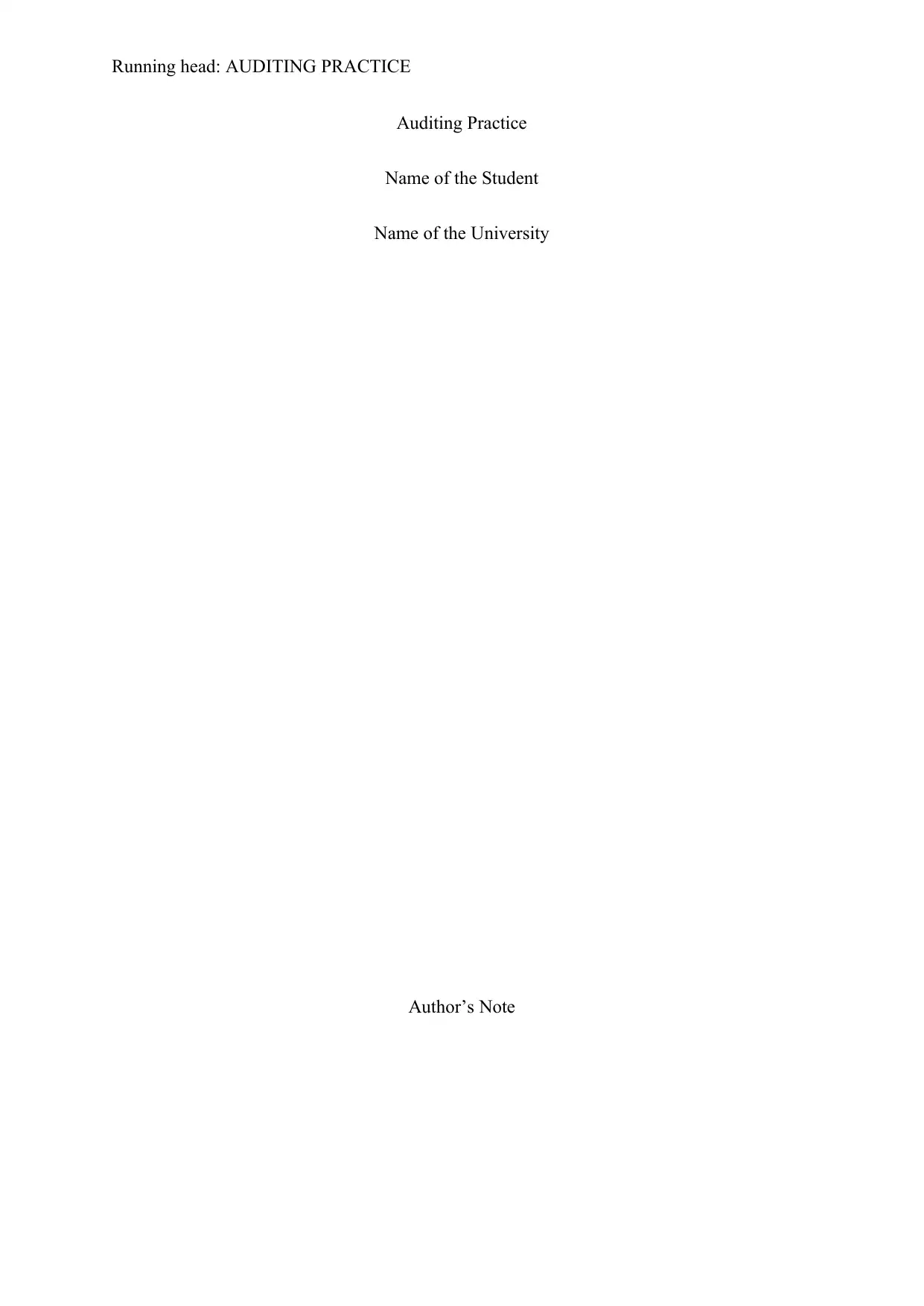
Running head: AUDITING PRACTICE
Auditing Practice
Name of the Student
Name of the University
Author’s Note
Auditing Practice
Name of the Student
Name of the University
Author’s Note
Paraphrase This Document
Need a fresh take? Get an instant paraphrase of this document with our AI Paraphraser
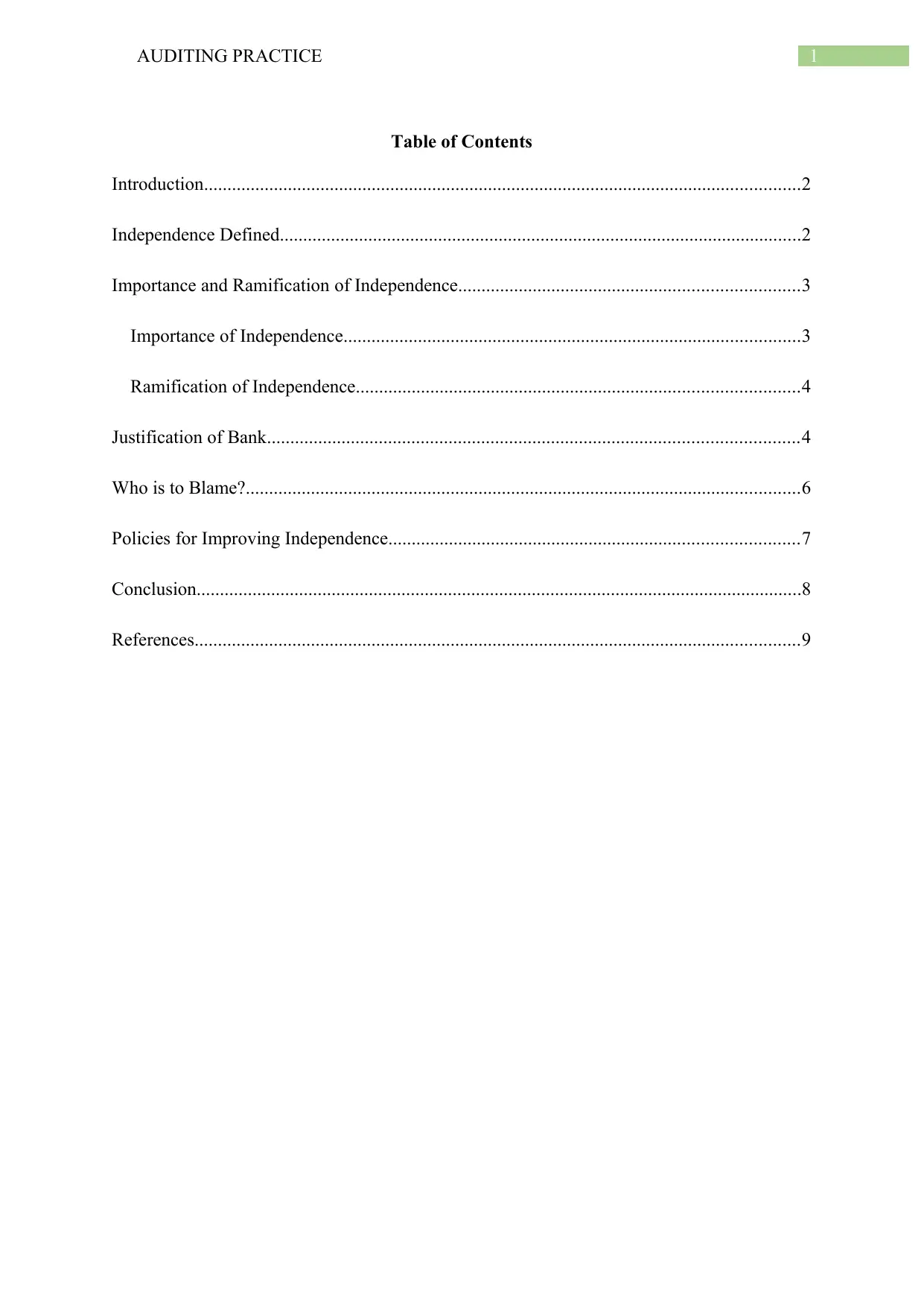
1AUDITING PRACTICE
Table of Contents
Introduction................................................................................................................................2
Independence Defined................................................................................................................2
Importance and Ramification of Independence.........................................................................3
Importance of Independence..................................................................................................3
Ramification of Independence...............................................................................................4
Justification of Bank..................................................................................................................4
Who is to Blame?.......................................................................................................................6
Policies for Improving Independence........................................................................................7
Conclusion..................................................................................................................................8
References..................................................................................................................................9
Table of Contents
Introduction................................................................................................................................2
Independence Defined................................................................................................................2
Importance and Ramification of Independence.........................................................................3
Importance of Independence..................................................................................................3
Ramification of Independence...............................................................................................4
Justification of Bank..................................................................................................................4
Who is to Blame?.......................................................................................................................6
Policies for Improving Independence........................................................................................7
Conclusion..................................................................................................................................8
References..................................................................................................................................9
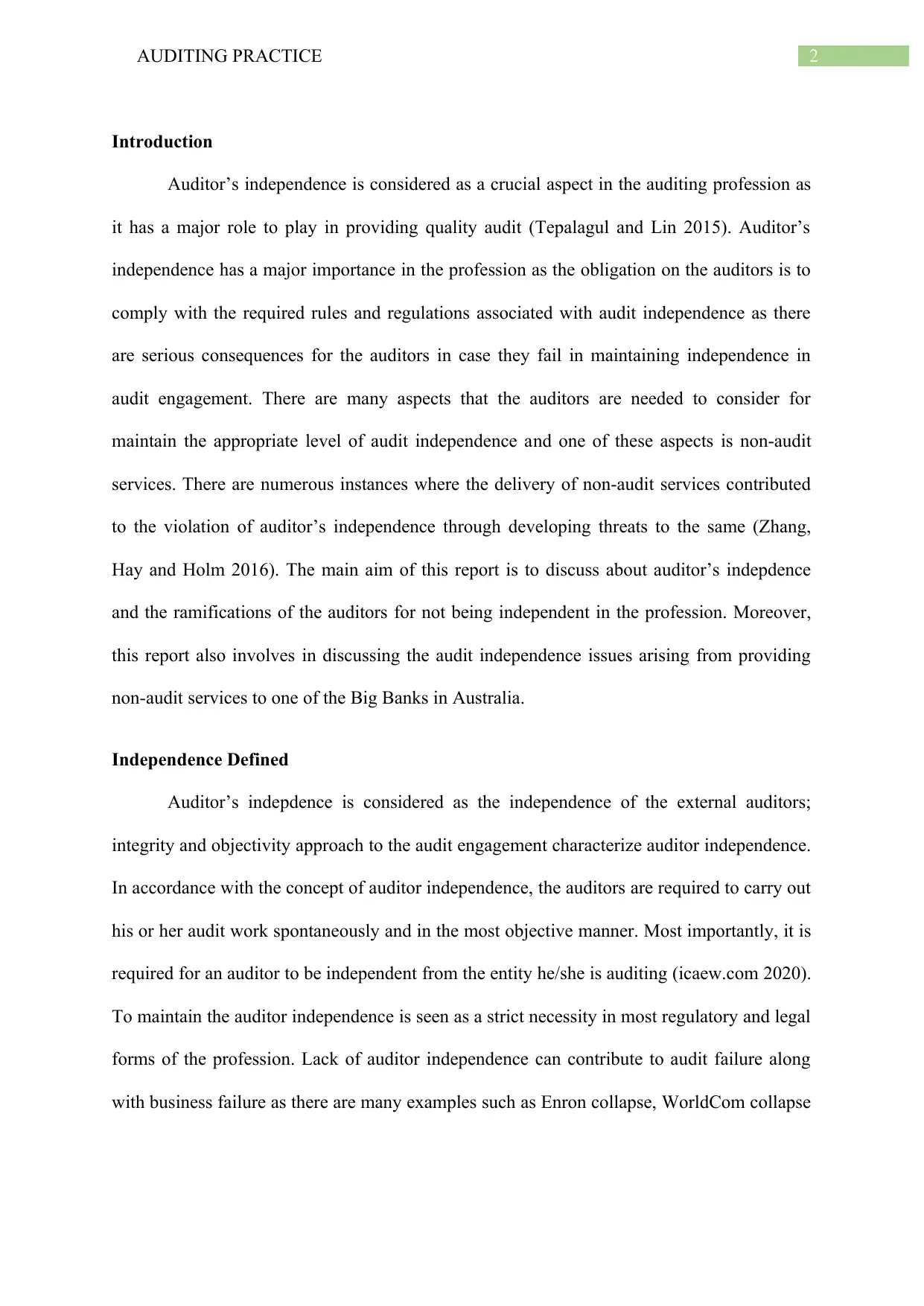
2AUDITING PRACTICE
Introduction
Auditor’s independence is considered as a crucial aspect in the auditing profession as
it has a major role to play in providing quality audit (Tepalagul and Lin 2015). Auditor’s
independence has a major importance in the profession as the obligation on the auditors is to
comply with the required rules and regulations associated with audit independence as there
are serious consequences for the auditors in case they fail in maintaining independence in
audit engagement. There are many aspects that the auditors are needed to consider for
maintain the appropriate level of audit independence and one of these aspects is non-audit
services. There are numerous instances where the delivery of non-audit services contributed
to the violation of auditor’s independence through developing threats to the same (Zhang,
Hay and Holm 2016). The main aim of this report is to discuss about auditor’s indepdence
and the ramifications of the auditors for not being independent in the profession. Moreover,
this report also involves in discussing the audit independence issues arising from providing
non-audit services to one of the Big Banks in Australia.
Independence Defined
Auditor’s indepdence is considered as the independence of the external auditors;
integrity and objectivity approach to the audit engagement characterize auditor independence.
In accordance with the concept of auditor independence, the auditors are required to carry out
his or her audit work spontaneously and in the most objective manner. Most importantly, it is
required for an auditor to be independent from the entity he/she is auditing (icaew.com 2020).
To maintain the auditor independence is seen as a strict necessity in most regulatory and legal
forms of the profession. Lack of auditor independence can contribute to audit failure along
with business failure as there are many examples such as Enron collapse, WorldCom collapse
Introduction
Auditor’s independence is considered as a crucial aspect in the auditing profession as
it has a major role to play in providing quality audit (Tepalagul and Lin 2015). Auditor’s
independence has a major importance in the profession as the obligation on the auditors is to
comply with the required rules and regulations associated with audit independence as there
are serious consequences for the auditors in case they fail in maintaining independence in
audit engagement. There are many aspects that the auditors are needed to consider for
maintain the appropriate level of audit independence and one of these aspects is non-audit
services. There are numerous instances where the delivery of non-audit services contributed
to the violation of auditor’s independence through developing threats to the same (Zhang,
Hay and Holm 2016). The main aim of this report is to discuss about auditor’s indepdence
and the ramifications of the auditors for not being independent in the profession. Moreover,
this report also involves in discussing the audit independence issues arising from providing
non-audit services to one of the Big Banks in Australia.
Independence Defined
Auditor’s indepdence is considered as the independence of the external auditors;
integrity and objectivity approach to the audit engagement characterize auditor independence.
In accordance with the concept of auditor independence, the auditors are required to carry out
his or her audit work spontaneously and in the most objective manner. Most importantly, it is
required for an auditor to be independent from the entity he/she is auditing (icaew.com 2020).
To maintain the auditor independence is seen as a strict necessity in most regulatory and legal
forms of the profession. Lack of auditor independence can contribute to audit failure along
with business failure as there are many examples such as Enron collapse, WorldCom collapse
⊘ This is a preview!⊘
Do you want full access?
Subscribe today to unlock all pages.

Trusted by 1+ million students worldwide
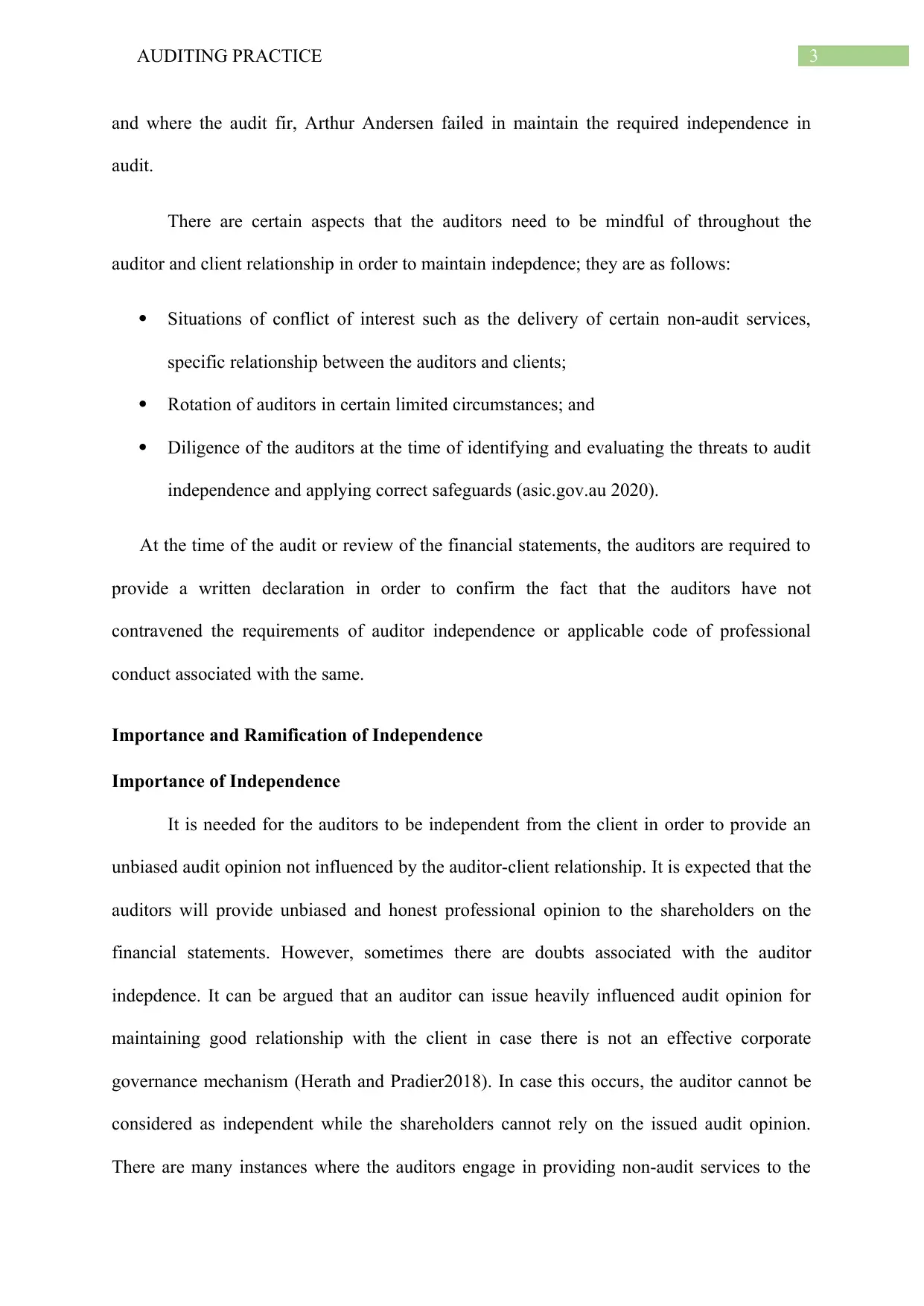
3AUDITING PRACTICE
and where the audit fir, Arthur Andersen failed in maintain the required independence in
audit.
There are certain aspects that the auditors need to be mindful of throughout the
auditor and client relationship in order to maintain indepdence; they are as follows:
Situations of conflict of interest such as the delivery of certain non-audit services,
specific relationship between the auditors and clients;
Rotation of auditors in certain limited circumstances; and
Diligence of the auditors at the time of identifying and evaluating the threats to audit
independence and applying correct safeguards (asic.gov.au 2020).
At the time of the audit or review of the financial statements, the auditors are required to
provide a written declaration in order to confirm the fact that the auditors have not
contravened the requirements of auditor independence or applicable code of professional
conduct associated with the same.
Importance and Ramification of Independence
Importance of Independence
It is needed for the auditors to be independent from the client in order to provide an
unbiased audit opinion not influenced by the auditor-client relationship. It is expected that the
auditors will provide unbiased and honest professional opinion to the shareholders on the
financial statements. However, sometimes there are doubts associated with the auditor
indepdence. It can be argued that an auditor can issue heavily influenced audit opinion for
maintaining good relationship with the client in case there is not an effective corporate
governance mechanism (Herath and Pradier2018). In case this occurs, the auditor cannot be
considered as independent while the shareholders cannot rely on the issued audit opinion.
There are many instances where the auditors engage in providing non-audit services to the
and where the audit fir, Arthur Andersen failed in maintain the required independence in
audit.
There are certain aspects that the auditors need to be mindful of throughout the
auditor and client relationship in order to maintain indepdence; they are as follows:
Situations of conflict of interest such as the delivery of certain non-audit services,
specific relationship between the auditors and clients;
Rotation of auditors in certain limited circumstances; and
Diligence of the auditors at the time of identifying and evaluating the threats to audit
independence and applying correct safeguards (asic.gov.au 2020).
At the time of the audit or review of the financial statements, the auditors are required to
provide a written declaration in order to confirm the fact that the auditors have not
contravened the requirements of auditor independence or applicable code of professional
conduct associated with the same.
Importance and Ramification of Independence
Importance of Independence
It is needed for the auditors to be independent from the client in order to provide an
unbiased audit opinion not influenced by the auditor-client relationship. It is expected that the
auditors will provide unbiased and honest professional opinion to the shareholders on the
financial statements. However, sometimes there are doubts associated with the auditor
indepdence. It can be argued that an auditor can issue heavily influenced audit opinion for
maintaining good relationship with the client in case there is not an effective corporate
governance mechanism (Herath and Pradier2018). In case this occurs, the auditor cannot be
considered as independent while the shareholders cannot rely on the issued audit opinion.
There are many instances where the auditors engage in providing non-audit services to the
Paraphrase This Document
Need a fresh take? Get an instant paraphrase of this document with our AI Paraphraser
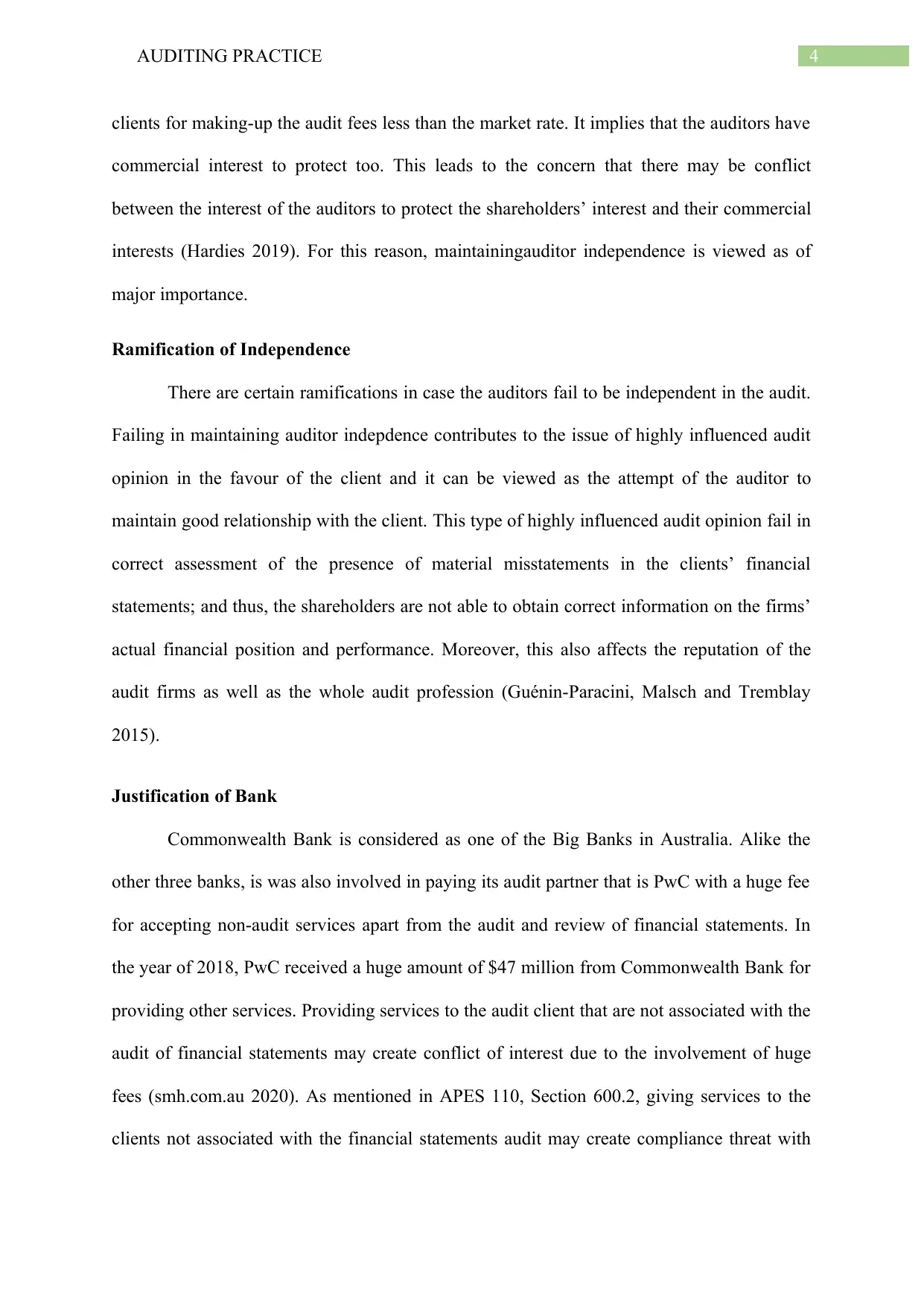
4AUDITING PRACTICE
clients for making-up the audit fees less than the market rate. It implies that the auditors have
commercial interest to protect too. This leads to the concern that there may be conflict
between the interest of the auditors to protect the shareholders’ interest and their commercial
interests (Hardies 2019). For this reason, maintainingauditor independence is viewed as of
major importance.
Ramification of Independence
There are certain ramifications in case the auditors fail to be independent in the audit.
Failing in maintaining auditor indepdence contributes to the issue of highly influenced audit
opinion in the favour of the client and it can be viewed as the attempt of the auditor to
maintain good relationship with the client. This type of highly influenced audit opinion fail in
correct assessment of the presence of material misstatements in the clients’ financial
statements; and thus, the shareholders are not able to obtain correct information on the firms’
actual financial position and performance. Moreover, this also affects the reputation of the
audit firms as well as the whole audit profession (Guénin-Paracini, Malsch and Tremblay
2015).
Justification of Bank
Commonwealth Bank is considered as one of the Big Banks in Australia. Alike the
other three banks, is was also involved in paying its audit partner that is PwC with a huge fee
for accepting non-audit services apart from the audit and review of financial statements. In
the year of 2018, PwC received a huge amount of $47 million from Commonwealth Bank for
providing other services. Providing services to the audit client that are not associated with the
audit of financial statements may create conflict of interest due to the involvement of huge
fees (smh.com.au 2020). As mentioned in APES 110, Section 600.2, giving services to the
clients not associated with the financial statements audit may create compliance threat with
clients for making-up the audit fees less than the market rate. It implies that the auditors have
commercial interest to protect too. This leads to the concern that there may be conflict
between the interest of the auditors to protect the shareholders’ interest and their commercial
interests (Hardies 2019). For this reason, maintainingauditor independence is viewed as of
major importance.
Ramification of Independence
There are certain ramifications in case the auditors fail to be independent in the audit.
Failing in maintaining auditor indepdence contributes to the issue of highly influenced audit
opinion in the favour of the client and it can be viewed as the attempt of the auditor to
maintain good relationship with the client. This type of highly influenced audit opinion fail in
correct assessment of the presence of material misstatements in the clients’ financial
statements; and thus, the shareholders are not able to obtain correct information on the firms’
actual financial position and performance. Moreover, this also affects the reputation of the
audit firms as well as the whole audit profession (Guénin-Paracini, Malsch and Tremblay
2015).
Justification of Bank
Commonwealth Bank is considered as one of the Big Banks in Australia. Alike the
other three banks, is was also involved in paying its audit partner that is PwC with a huge fee
for accepting non-audit services apart from the audit and review of financial statements. In
the year of 2018, PwC received a huge amount of $47 million from Commonwealth Bank for
providing other services. Providing services to the audit client that are not associated with the
audit of financial statements may create conflict of interest due to the involvement of huge
fees (smh.com.au 2020). As mentioned in APES 110, Section 600.2, giving services to the
clients not associated with the financial statements audit may create compliance threat with
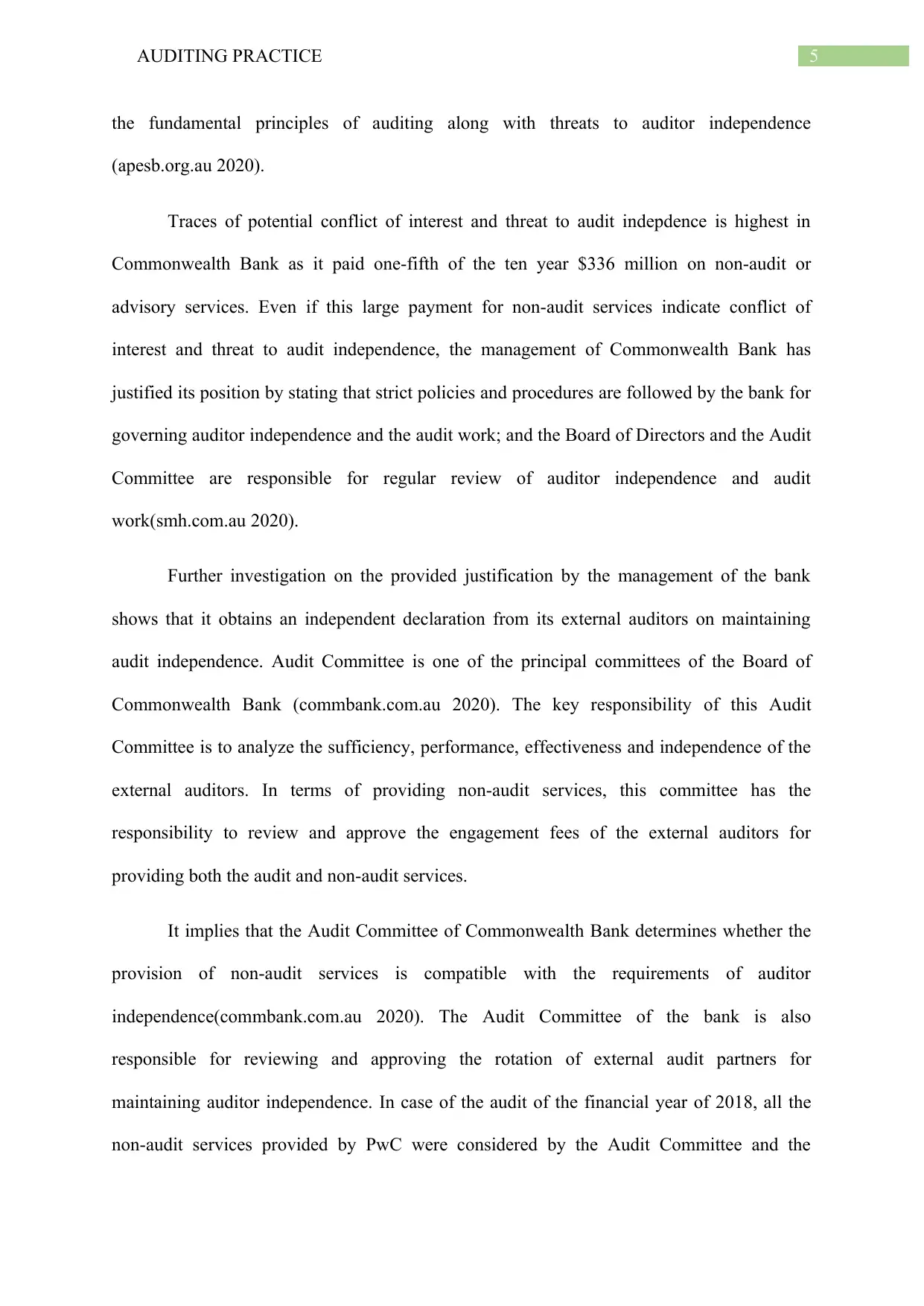
5AUDITING PRACTICE
the fundamental principles of auditing along with threats to auditor independence
(apesb.org.au 2020).
Traces of potential conflict of interest and threat to audit indepdence is highest in
Commonwealth Bank as it paid one-fifth of the ten year $336 million on non-audit or
advisory services. Even if this large payment for non-audit services indicate conflict of
interest and threat to audit independence, the management of Commonwealth Bank has
justified its position by stating that strict policies and procedures are followed by the bank for
governing auditor independence and the audit work; and the Board of Directors and the Audit
Committee are responsible for regular review of auditor independence and audit
work(smh.com.au 2020).
Further investigation on the provided justification by the management of the bank
shows that it obtains an independent declaration from its external auditors on maintaining
audit independence. Audit Committee is one of the principal committees of the Board of
Commonwealth Bank (commbank.com.au 2020). The key responsibility of this Audit
Committee is to analyze the sufficiency, performance, effectiveness and independence of the
external auditors. In terms of providing non-audit services, this committee has the
responsibility to review and approve the engagement fees of the external auditors for
providing both the audit and non-audit services.
It implies that the Audit Committee of Commonwealth Bank determines whether the
provision of non-audit services is compatible with the requirements of auditor
independence(commbank.com.au 2020). The Audit Committee of the bank is also
responsible for reviewing and approving the rotation of external audit partners for
maintaining auditor independence. In case of the audit of the financial year of 2018, all the
non-audit services provided by PwC were considered by the Audit Committee and the
the fundamental principles of auditing along with threats to auditor independence
(apesb.org.au 2020).
Traces of potential conflict of interest and threat to audit indepdence is highest in
Commonwealth Bank as it paid one-fifth of the ten year $336 million on non-audit or
advisory services. Even if this large payment for non-audit services indicate conflict of
interest and threat to audit independence, the management of Commonwealth Bank has
justified its position by stating that strict policies and procedures are followed by the bank for
governing auditor independence and the audit work; and the Board of Directors and the Audit
Committee are responsible for regular review of auditor independence and audit
work(smh.com.au 2020).
Further investigation on the provided justification by the management of the bank
shows that it obtains an independent declaration from its external auditors on maintaining
audit independence. Audit Committee is one of the principal committees of the Board of
Commonwealth Bank (commbank.com.au 2020). The key responsibility of this Audit
Committee is to analyze the sufficiency, performance, effectiveness and independence of the
external auditors. In terms of providing non-audit services, this committee has the
responsibility to review and approve the engagement fees of the external auditors for
providing both the audit and non-audit services.
It implies that the Audit Committee of Commonwealth Bank determines whether the
provision of non-audit services is compatible with the requirements of auditor
independence(commbank.com.au 2020). The Audit Committee of the bank is also
responsible for reviewing and approving the rotation of external audit partners for
maintaining auditor independence. In case of the audit of the financial year of 2018, all the
non-audit services provided by PwC were considered by the Audit Committee and the
⊘ This is a preview!⊘
Do you want full access?
Subscribe today to unlock all pages.

Trusted by 1+ million students worldwide
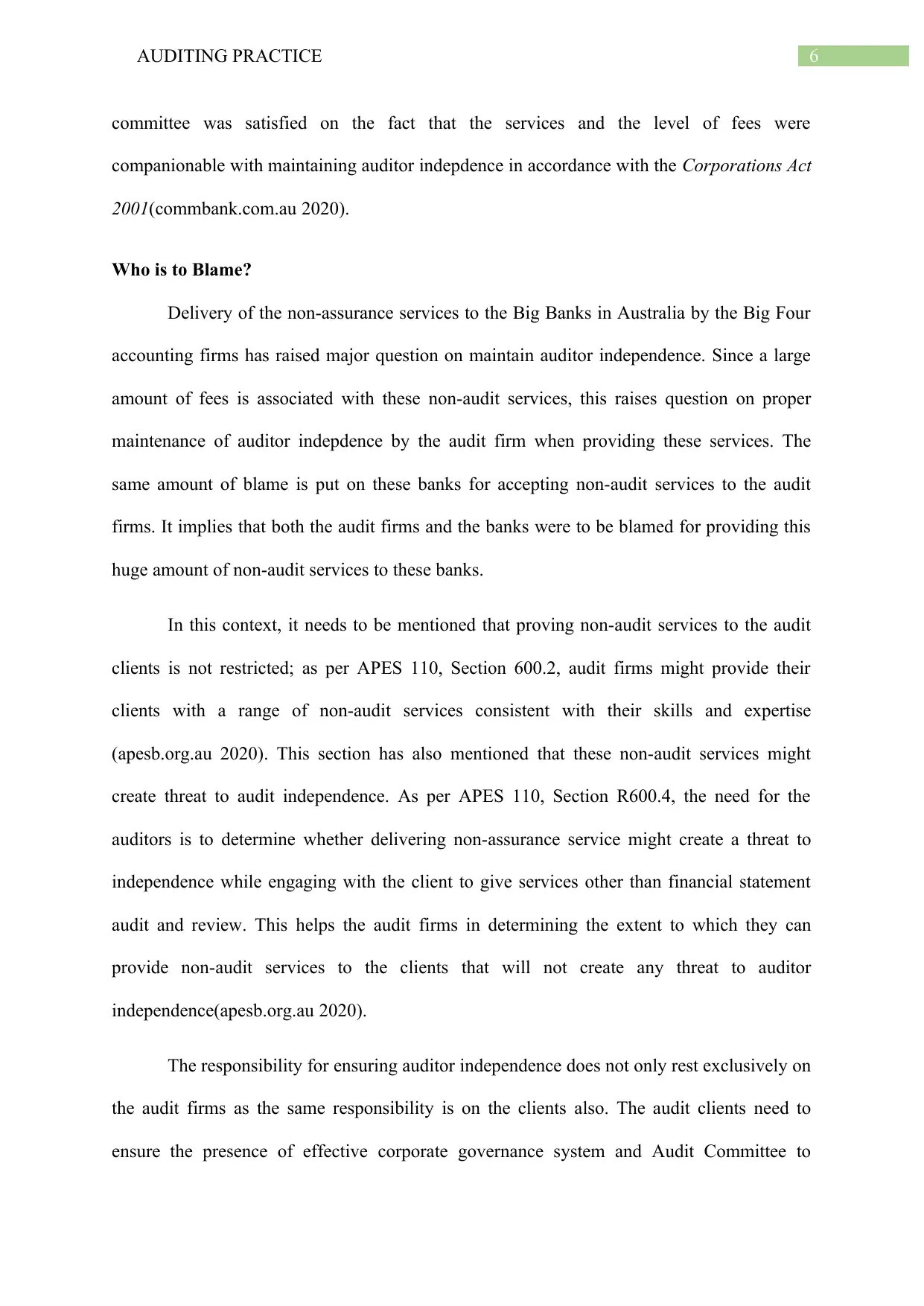
6AUDITING PRACTICE
committee was satisfied on the fact that the services and the level of fees were
companionable with maintaining auditor indepdence in accordance with the Corporations Act
2001(commbank.com.au 2020).
Who is to Blame?
Delivery of the non-assurance services to the Big Banks in Australia by the Big Four
accounting firms has raised major question on maintain auditor independence. Since a large
amount of fees is associated with these non-audit services, this raises question on proper
maintenance of auditor indepdence by the audit firm when providing these services. The
same amount of blame is put on these banks for accepting non-audit services to the audit
firms. It implies that both the audit firms and the banks were to be blamed for providing this
huge amount of non-audit services to these banks.
In this context, it needs to be mentioned that proving non-audit services to the audit
clients is not restricted; as per APES 110, Section 600.2, audit firms might provide their
clients with a range of non-audit services consistent with their skills and expertise
(apesb.org.au 2020). This section has also mentioned that these non-audit services might
create threat to audit independence. As per APES 110, Section R600.4, the need for the
auditors is to determine whether delivering non-assurance service might create a threat to
independence while engaging with the client to give services other than financial statement
audit and review. This helps the audit firms in determining the extent to which they can
provide non-audit services to the clients that will not create any threat to auditor
independence(apesb.org.au 2020).
The responsibility for ensuring auditor independence does not only rest exclusively on
the audit firms as the same responsibility is on the clients also. The audit clients need to
ensure the presence of effective corporate governance system and Audit Committee to
committee was satisfied on the fact that the services and the level of fees were
companionable with maintaining auditor indepdence in accordance with the Corporations Act
2001(commbank.com.au 2020).
Who is to Blame?
Delivery of the non-assurance services to the Big Banks in Australia by the Big Four
accounting firms has raised major question on maintain auditor independence. Since a large
amount of fees is associated with these non-audit services, this raises question on proper
maintenance of auditor indepdence by the audit firm when providing these services. The
same amount of blame is put on these banks for accepting non-audit services to the audit
firms. It implies that both the audit firms and the banks were to be blamed for providing this
huge amount of non-audit services to these banks.
In this context, it needs to be mentioned that proving non-audit services to the audit
clients is not restricted; as per APES 110, Section 600.2, audit firms might provide their
clients with a range of non-audit services consistent with their skills and expertise
(apesb.org.au 2020). This section has also mentioned that these non-audit services might
create threat to audit independence. As per APES 110, Section R600.4, the need for the
auditors is to determine whether delivering non-assurance service might create a threat to
independence while engaging with the client to give services other than financial statement
audit and review. This helps the audit firms in determining the extent to which they can
provide non-audit services to the clients that will not create any threat to auditor
independence(apesb.org.au 2020).
The responsibility for ensuring auditor independence does not only rest exclusively on
the audit firms as the same responsibility is on the clients also. The audit clients need to
ensure the presence of effective corporate governance system and Audit Committee to
Paraphrase This Document
Need a fresh take? Get an instant paraphrase of this document with our AI Paraphraser
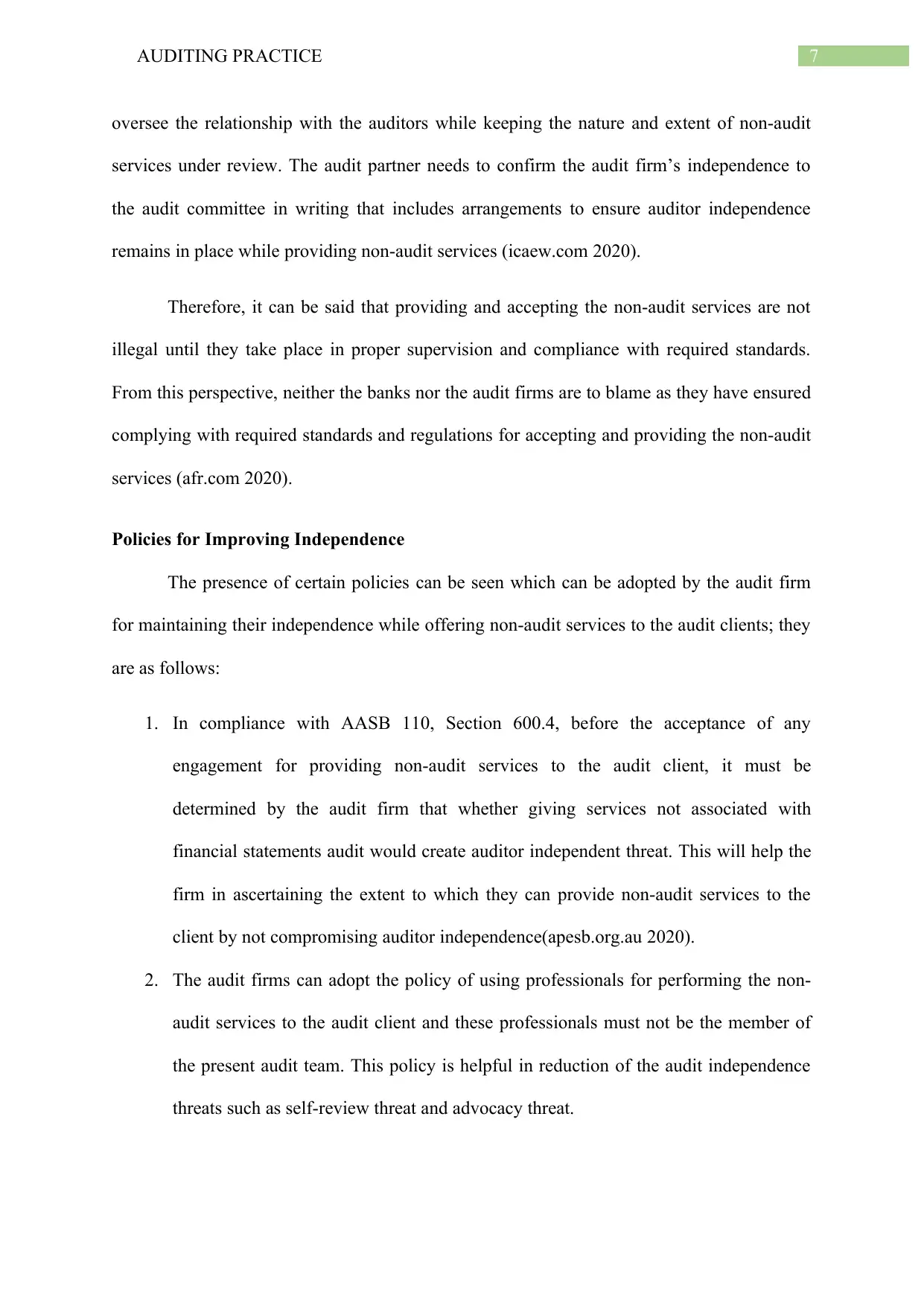
7AUDITING PRACTICE
oversee the relationship with the auditors while keeping the nature and extent of non-audit
services under review. The audit partner needs to confirm the audit firm’s independence to
the audit committee in writing that includes arrangements to ensure auditor independence
remains in place while providing non-audit services (icaew.com 2020).
Therefore, it can be said that providing and accepting the non-audit services are not
illegal until they take place in proper supervision and compliance with required standards.
From this perspective, neither the banks nor the audit firms are to blame as they have ensured
complying with required standards and regulations for accepting and providing the non-audit
services (afr.com 2020).
Policies for Improving Independence
The presence of certain policies can be seen which can be adopted by the audit firm
for maintaining their independence while offering non-audit services to the audit clients; they
are as follows:
1. In compliance with AASB 110, Section 600.4, before the acceptance of any
engagement for providing non-audit services to the audit client, it must be
determined by the audit firm that whether giving services not associated with
financial statements audit would create auditor independent threat. This will help the
firm in ascertaining the extent to which they can provide non-audit services to the
client by not compromising auditor independence(apesb.org.au 2020).
2. The audit firms can adopt the policy of using professionals for performing the non-
audit services to the audit client and these professionals must not be the member of
the present audit team. This policy is helpful in reduction of the audit independence
threats such as self-review threat and advocacy threat.
oversee the relationship with the auditors while keeping the nature and extent of non-audit
services under review. The audit partner needs to confirm the audit firm’s independence to
the audit committee in writing that includes arrangements to ensure auditor independence
remains in place while providing non-audit services (icaew.com 2020).
Therefore, it can be said that providing and accepting the non-audit services are not
illegal until they take place in proper supervision and compliance with required standards.
From this perspective, neither the banks nor the audit firms are to blame as they have ensured
complying with required standards and regulations for accepting and providing the non-audit
services (afr.com 2020).
Policies for Improving Independence
The presence of certain policies can be seen which can be adopted by the audit firm
for maintaining their independence while offering non-audit services to the audit clients; they
are as follows:
1. In compliance with AASB 110, Section 600.4, before the acceptance of any
engagement for providing non-audit services to the audit client, it must be
determined by the audit firm that whether giving services not associated with
financial statements audit would create auditor independent threat. This will help the
firm in ascertaining the extent to which they can provide non-audit services to the
client by not compromising auditor independence(apesb.org.au 2020).
2. The audit firms can adopt the policy of using professionals for performing the non-
audit services to the audit client and these professionals must not be the member of
the present audit team. This policy is helpful in reduction of the audit independence
threats such as self-review threat and advocacy threat.
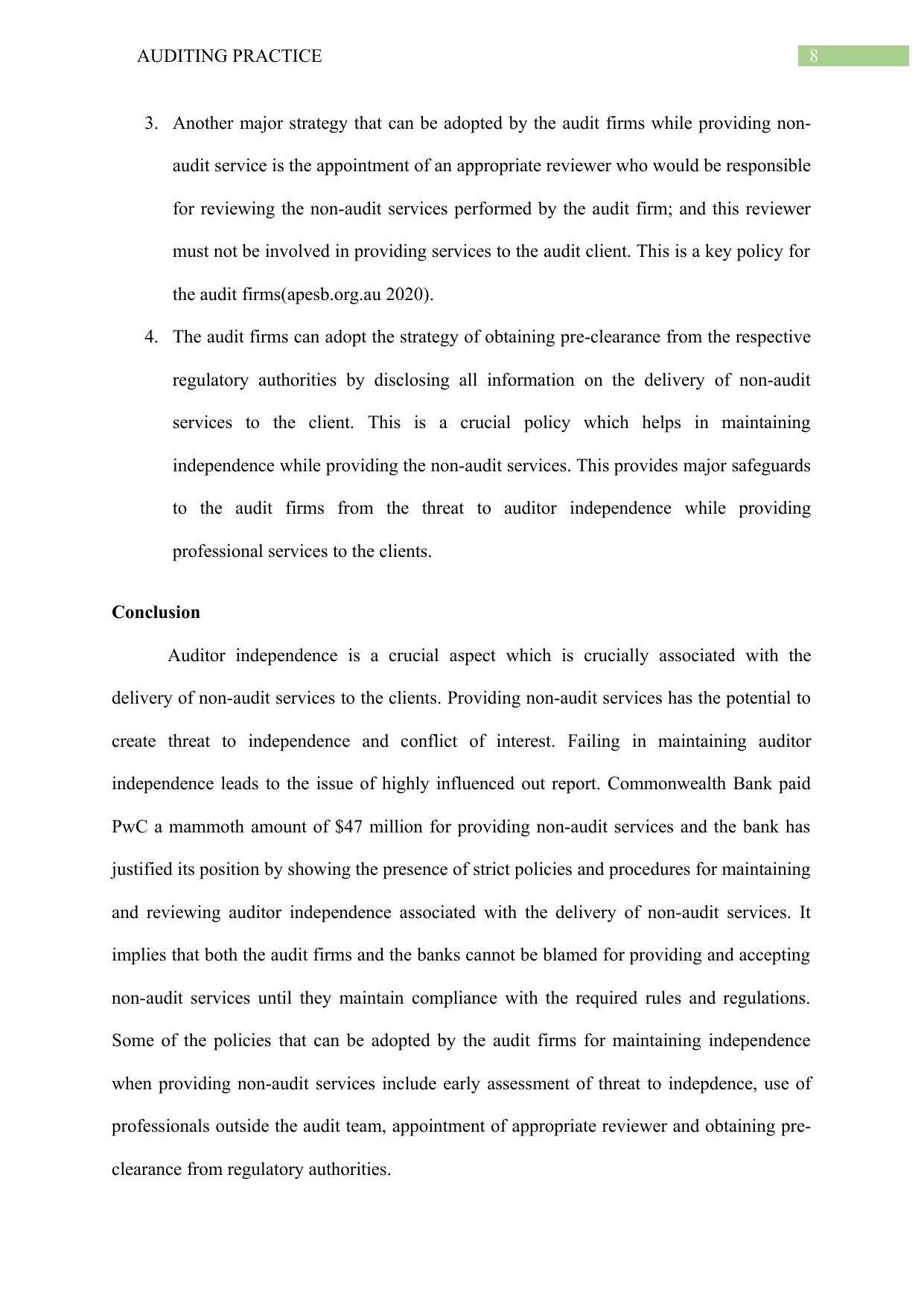
8AUDITING PRACTICE
3. Another major strategy that can be adopted by the audit firms while providing non-
audit service is the appointment of an appropriate reviewer who would be responsible
for reviewing the non-audit services performed by the audit firm; and this reviewer
must not be involved in providing services to the audit client. This is a key policy for
the audit firms(apesb.org.au 2020).
4. The audit firms can adopt the strategy of obtaining pre-clearance from the respective
regulatory authorities by disclosing all information on the delivery of non-audit
services to the client. This is a crucial policy which helps in maintaining
independence while providing the non-audit services. This provides major safeguards
to the audit firms from the threat to auditor independence while providing
professional services to the clients.
Conclusion
Auditor independence is a crucial aspect which is crucially associated with the
delivery of non-audit services to the clients. Providing non-audit services has the potential to
create threat to independence and conflict of interest. Failing in maintaining auditor
independence leads to the issue of highly influenced out report. Commonwealth Bank paid
PwC a mammoth amount of $47 million for providing non-audit services and the bank has
justified its position by showing the presence of strict policies and procedures for maintaining
and reviewing auditor independence associated with the delivery of non-audit services. It
implies that both the audit firms and the banks cannot be blamed for providing and accepting
non-audit services until they maintain compliance with the required rules and regulations.
Some of the policies that can be adopted by the audit firms for maintaining independence
when providing non-audit services include early assessment of threat to indepdence, use of
professionals outside the audit team, appointment of appropriate reviewer and obtaining pre-
clearance from regulatory authorities.
3. Another major strategy that can be adopted by the audit firms while providing non-
audit service is the appointment of an appropriate reviewer who would be responsible
for reviewing the non-audit services performed by the audit firm; and this reviewer
must not be involved in providing services to the audit client. This is a key policy for
the audit firms(apesb.org.au 2020).
4. The audit firms can adopt the strategy of obtaining pre-clearance from the respective
regulatory authorities by disclosing all information on the delivery of non-audit
services to the client. This is a crucial policy which helps in maintaining
independence while providing the non-audit services. This provides major safeguards
to the audit firms from the threat to auditor independence while providing
professional services to the clients.
Conclusion
Auditor independence is a crucial aspect which is crucially associated with the
delivery of non-audit services to the clients. Providing non-audit services has the potential to
create threat to independence and conflict of interest. Failing in maintaining auditor
independence leads to the issue of highly influenced out report. Commonwealth Bank paid
PwC a mammoth amount of $47 million for providing non-audit services and the bank has
justified its position by showing the presence of strict policies and procedures for maintaining
and reviewing auditor independence associated with the delivery of non-audit services. It
implies that both the audit firms and the banks cannot be blamed for providing and accepting
non-audit services until they maintain compliance with the required rules and regulations.
Some of the policies that can be adopted by the audit firms for maintaining independence
when providing non-audit services include early assessment of threat to indepdence, use of
professionals outside the audit team, appointment of appropriate reviewer and obtaining pre-
clearance from regulatory authorities.
⊘ This is a preview!⊘
Do you want full access?
Subscribe today to unlock all pages.

Trusted by 1+ million students worldwide
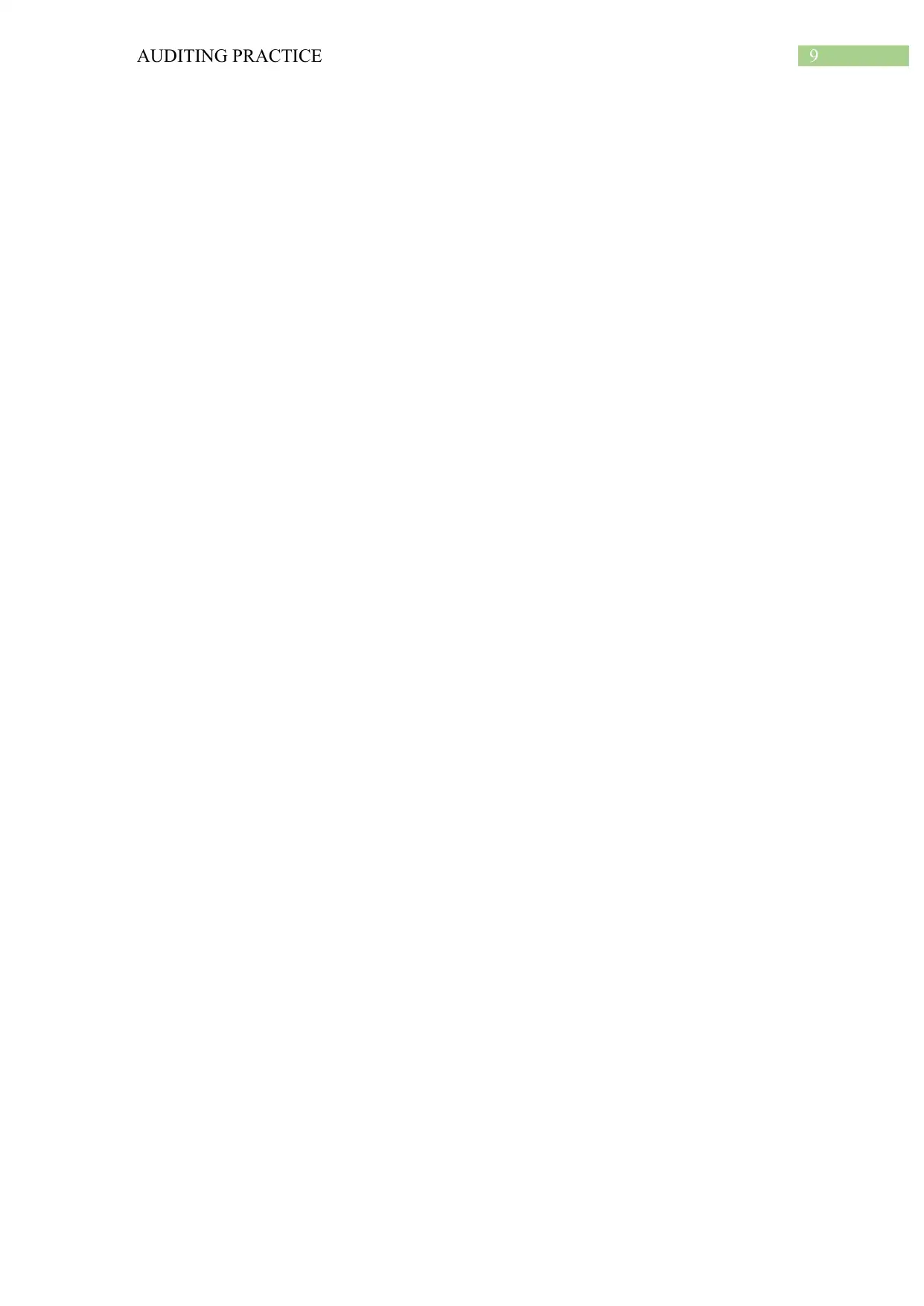
9AUDITING PRACTICE
Paraphrase This Document
Need a fresh take? Get an instant paraphrase of this document with our AI Paraphraser
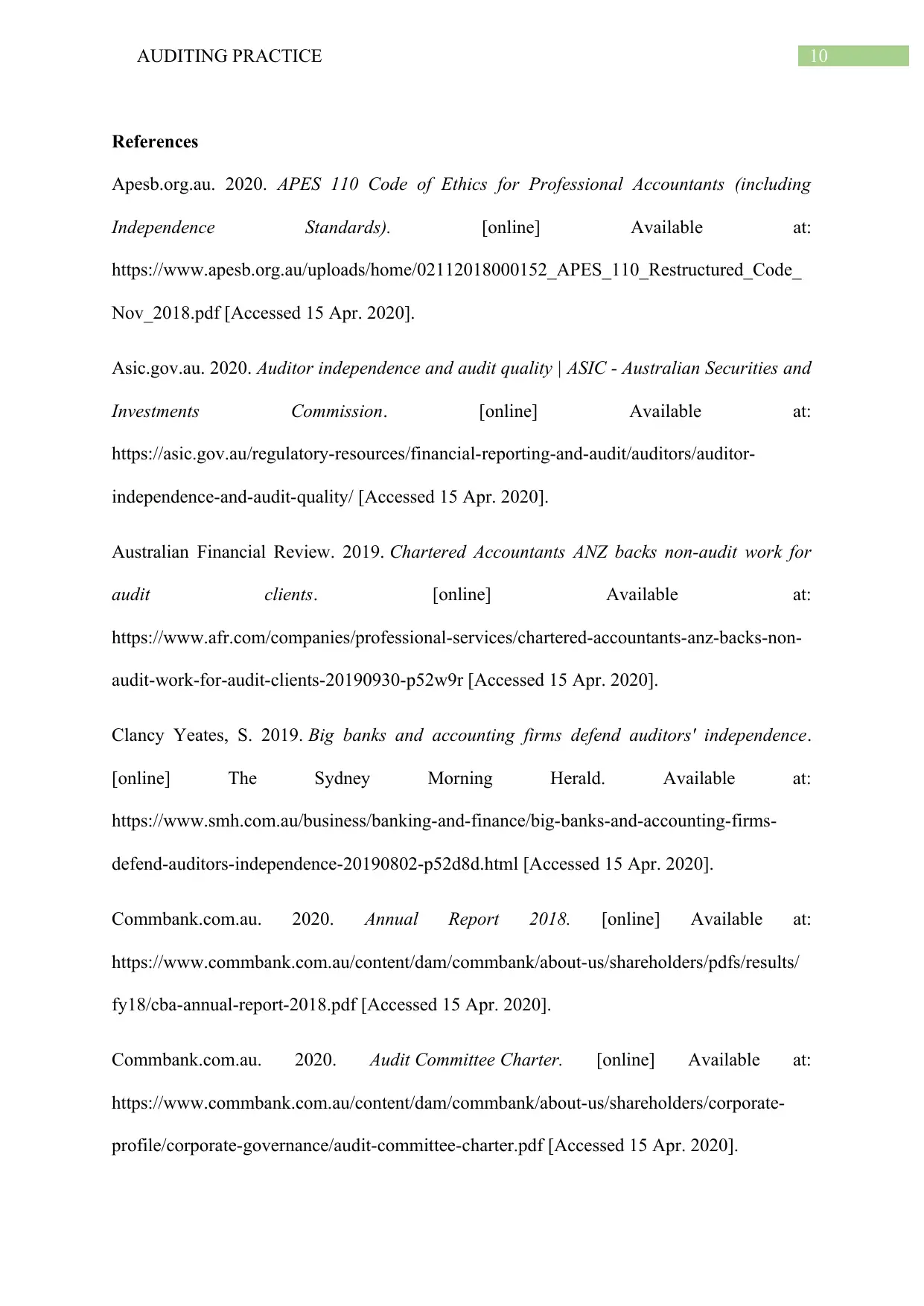
10AUDITING PRACTICE
References
Apesb.org.au. 2020. APES 110 Code of Ethics for Professional Accountants (including
Independence Standards). [online] Available at:
https://www.apesb.org.au/uploads/home/02112018000152_APES_110_Restructured_Code_
Nov_2018.pdf [Accessed 15 Apr. 2020].
Asic.gov.au. 2020. Auditor independence and audit quality | ASIC - Australian Securities and
Investments Commission. [online] Available at:
https://asic.gov.au/regulatory-resources/financial-reporting-and-audit/auditors/auditor-
independence-and-audit-quality/ [Accessed 15 Apr. 2020].
Australian Financial Review. 2019. Chartered Accountants ANZ backs non-audit work for
audit clients. [online] Available at:
https://www.afr.com/companies/professional-services/chartered-accountants-anz-backs-non-
audit-work-for-audit-clients-20190930-p52w9r [Accessed 15 Apr. 2020].
Clancy Yeates, S. 2019. Big banks and accounting firms defend auditors' independence.
[online] The Sydney Morning Herald. Available at:
https://www.smh.com.au/business/banking-and-finance/big-banks-and-accounting-firms-
defend-auditors-independence-20190802-p52d8d.html [Accessed 15 Apr. 2020].
Commbank.com.au. 2020. Annual Report 2018. [online] Available at:
https://www.commbank.com.au/content/dam/commbank/about-us/shareholders/pdfs/results/
fy18/cba-annual-report-2018.pdf [Accessed 15 Apr. 2020].
Commbank.com.au. 2020. Audit Committee Charter. [online] Available at:
https://www.commbank.com.au/content/dam/commbank/about-us/shareholders/corporate-
profile/corporate-governance/audit-committee-charter.pdf [Accessed 15 Apr. 2020].
References
Apesb.org.au. 2020. APES 110 Code of Ethics for Professional Accountants (including
Independence Standards). [online] Available at:
https://www.apesb.org.au/uploads/home/02112018000152_APES_110_Restructured_Code_
Nov_2018.pdf [Accessed 15 Apr. 2020].
Asic.gov.au. 2020. Auditor independence and audit quality | ASIC - Australian Securities and
Investments Commission. [online] Available at:
https://asic.gov.au/regulatory-resources/financial-reporting-and-audit/auditors/auditor-
independence-and-audit-quality/ [Accessed 15 Apr. 2020].
Australian Financial Review. 2019. Chartered Accountants ANZ backs non-audit work for
audit clients. [online] Available at:
https://www.afr.com/companies/professional-services/chartered-accountants-anz-backs-non-
audit-work-for-audit-clients-20190930-p52w9r [Accessed 15 Apr. 2020].
Clancy Yeates, S. 2019. Big banks and accounting firms defend auditors' independence.
[online] The Sydney Morning Herald. Available at:
https://www.smh.com.au/business/banking-and-finance/big-banks-and-accounting-firms-
defend-auditors-independence-20190802-p52d8d.html [Accessed 15 Apr. 2020].
Commbank.com.au. 2020. Annual Report 2018. [online] Available at:
https://www.commbank.com.au/content/dam/commbank/about-us/shareholders/pdfs/results/
fy18/cba-annual-report-2018.pdf [Accessed 15 Apr. 2020].
Commbank.com.au. 2020. Audit Committee Charter. [online] Available at:
https://www.commbank.com.au/content/dam/commbank/about-us/shareholders/corporate-
profile/corporate-governance/audit-committee-charter.pdf [Accessed 15 Apr. 2020].
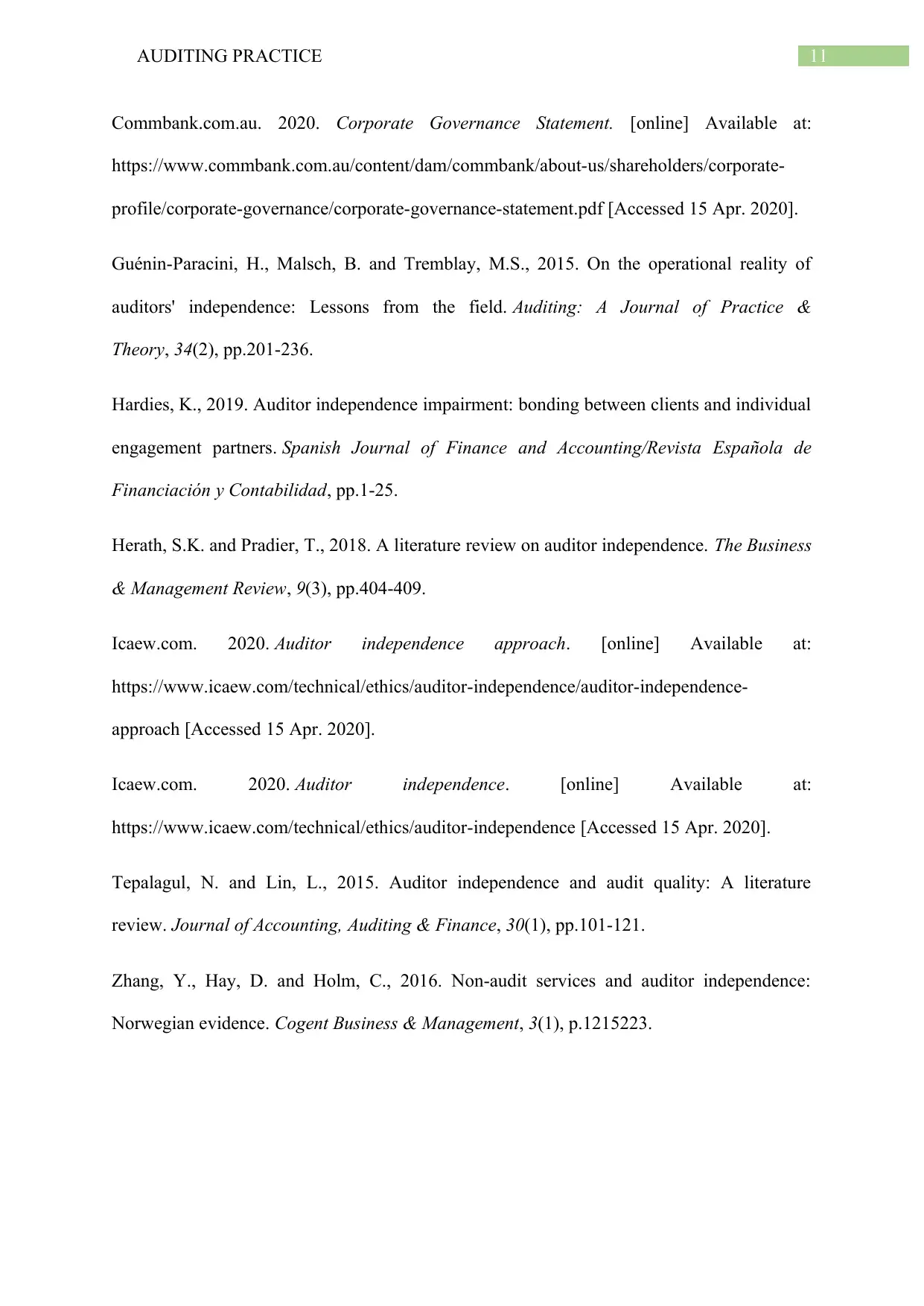
11AUDITING PRACTICE
Commbank.com.au. 2020. Corporate Governance Statement. [online] Available at:
https://www.commbank.com.au/content/dam/commbank/about-us/shareholders/corporate-
profile/corporate-governance/corporate-governance-statement.pdf [Accessed 15 Apr. 2020].
Guénin-Paracini, H., Malsch, B. and Tremblay, M.S., 2015. On the operational reality of
auditors' independence: Lessons from the field. Auditing: A Journal of Practice &
Theory, 34(2), pp.201-236.
Hardies, K., 2019. Auditor independence impairment: bonding between clients and individual
engagement partners. Spanish Journal of Finance and Accounting/Revista Española de
Financiación y Contabilidad, pp.1-25.
Herath, S.K. and Pradier, T., 2018. A literature review on auditor independence. The Business
& Management Review, 9(3), pp.404-409.
Icaew.com. 2020. Auditor independence approach. [online] Available at:
https://www.icaew.com/technical/ethics/auditor-independence/auditor-independence-
approach [Accessed 15 Apr. 2020].
Icaew.com. 2020. Auditor independence. [online] Available at:
https://www.icaew.com/technical/ethics/auditor-independence [Accessed 15 Apr. 2020].
Tepalagul, N. and Lin, L., 2015. Auditor independence and audit quality: A literature
review. Journal of Accounting, Auditing & Finance, 30(1), pp.101-121.
Zhang, Y., Hay, D. and Holm, C., 2016. Non-audit services and auditor independence:
Norwegian evidence. Cogent Business & Management, 3(1), p.1215223.
Commbank.com.au. 2020. Corporate Governance Statement. [online] Available at:
https://www.commbank.com.au/content/dam/commbank/about-us/shareholders/corporate-
profile/corporate-governance/corporate-governance-statement.pdf [Accessed 15 Apr. 2020].
Guénin-Paracini, H., Malsch, B. and Tremblay, M.S., 2015. On the operational reality of
auditors' independence: Lessons from the field. Auditing: A Journal of Practice &
Theory, 34(2), pp.201-236.
Hardies, K., 2019. Auditor independence impairment: bonding between clients and individual
engagement partners. Spanish Journal of Finance and Accounting/Revista Española de
Financiación y Contabilidad, pp.1-25.
Herath, S.K. and Pradier, T., 2018. A literature review on auditor independence. The Business
& Management Review, 9(3), pp.404-409.
Icaew.com. 2020. Auditor independence approach. [online] Available at:
https://www.icaew.com/technical/ethics/auditor-independence/auditor-independence-
approach [Accessed 15 Apr. 2020].
Icaew.com. 2020. Auditor independence. [online] Available at:
https://www.icaew.com/technical/ethics/auditor-independence [Accessed 15 Apr. 2020].
Tepalagul, N. and Lin, L., 2015. Auditor independence and audit quality: A literature
review. Journal of Accounting, Auditing & Finance, 30(1), pp.101-121.
Zhang, Y., Hay, D. and Holm, C., 2016. Non-audit services and auditor independence:
Norwegian evidence. Cogent Business & Management, 3(1), p.1215223.
⊘ This is a preview!⊘
Do you want full access?
Subscribe today to unlock all pages.

Trusted by 1+ million students worldwide
1 out of 12
Related Documents
Your All-in-One AI-Powered Toolkit for Academic Success.
+13062052269
info@desklib.com
Available 24*7 on WhatsApp / Email
![[object Object]](/_next/static/media/star-bottom.7253800d.svg)
Unlock your academic potential
Copyright © 2020–2026 A2Z Services. All Rights Reserved. Developed and managed by ZUCOL.





